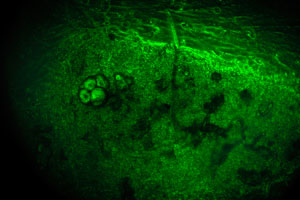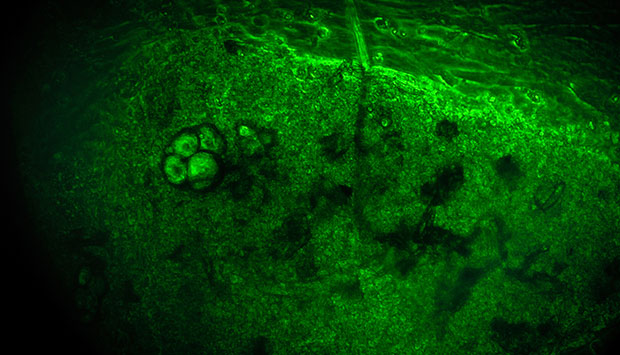
The introduction of polyoma virus small T proteins into human skin cells in culture (shown) was shown to increase the activity of Yes-associated protein (YAP), which is implicated in tumor formation.
© MickyWiswedel/iStock/Thinkstock
Normal cells can be transformed into tumors in cell culture systems by introducing various genes, including some that come from viruses. Now, a team of Singapore-based researchers have identified the signaling pathways involved in this mode of tumor transformation. The findings could provide novel targets for drug development against cancers caused by the viruses.
Normal cells usually must adhere to a substrate in order to grow. But the introduction of genes that express viral proteins — such as the small T proteins from the SV40 virus or the polyoma virus — into normal cells causes a switch that allows the cells to grow without being attached to a substrate. Such a lack of attachment is a key property of many tumors.
The researchers, led by Stephen Cohen from the A*STAR Institute of Molecular and Cell Biology, focused on the Hippo tumor suppressor pathway. This regulatory pathway involves a series of signaling events that prevent cells from transforming into tumors, including the inactivation of the transcriptional activator Yes-associated protein (YAP).
Previous work has shown that by increasing YAP expression normal cells are enabled to grow even without adhering to their substrate — a similar switch to that induced by the expression of virus proteins. The findings led Cohen and his colleagues to hypothesize that YAP may be involved in the transformation of normal cells into tumors by viruses.
Using gene delivery techniques, the researchers found that increasing YAP activity in normal cells can replace the role of small T viral proteins in supporting cell growth without a solid substrate. Furthermore, they showed that when YAP expression was reduced, there was a restriction in the anchorage-independent growth of cells expressing SV40 small T proteins.
Although the role of SV40 virus has not been proven in human cancer, polyoma virus has been implicated in causing a type of human skin cancer known as Merkel cell carcinoma. The researchers therefore decided to extend their experiment to polyoma virus proteins. They found that the introduction of polyoma virus small T proteins into human cells in culture increased the activity of YAP. When YAP activity was reduced, however, the polyoma virus small T proteins showed reduced ability to induce tumor formation.
These findings indicate that the activation of YAP is required for viral transformation of normal cells into tumor cells. “Strategies to target YAP activity could lead to the development of a new generation of cancer drugs,” says Cohen.
The A*STAR-affiliated researchers contributing to this research are from the Institute of Molecular and Cell Biology.




